沈阳版牛津英语8B英语导学案15
八年级英语 Unit 5 Reading 最佳教案导学案教学设计
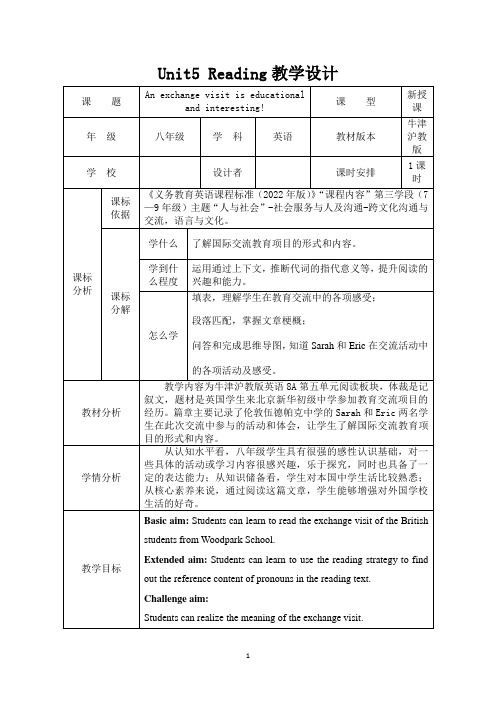
Para.2 what Eric has learnt in ChinaPara.3what Sarah plans to do when she returns home
Para.4what Sarah has learnt in a host family
Extended aim:Students can learn to use the reading strategy to find out the reference content of pronouns in the reading text.
Challenge aim:
Students can realize the meaning of the exchange visit.
学情分析
从认知水平看,八年级学生具有很强的感性认识基础,对一些具体的活动或学习内容很感兴趣,乐于探究,同时也具备了一定的表达能力;从知识储备看,学生对本国中学生活比较熟悉;从核心素养来说,通过阅读这篇文章,学生能够增强对外国学校生活的好奇。
教学目标
Basic aim:Students can learnto readthe exchange visit of the British students from Woodpark School.
Unit5 Reading教学设计
课 题
An exchange visit is educational and interesting!
课 型
新授课
年 级
八年级
学 科
英语
教材版本
牛津沪教版
学 校
8B Unit 1 Study skills 导学案2023-2024学年牛津译林版英语八年级下册
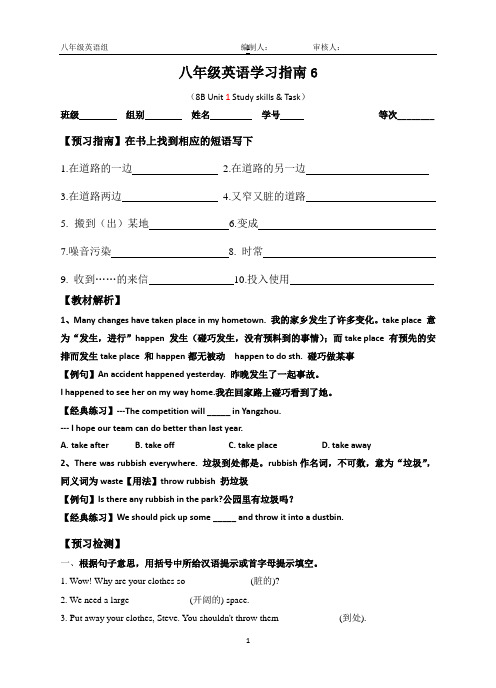
八年级英语学习指南6(8B Unit 1 Study skills & Task)班级组别姓名学号等次________【预习指南】在书上找到相应的短语写下1.在道路的一边2.在道路的另一边3.在道路两边4.又窄又脏的道路5.搬到(出)某地6.变成7.噪音污染8. 时常9. 收到……的来信10.投入使用【教材解析】1、Many changes have taken place in my hometown. 我的家乡发生了许多变化。
take place 意为“发生,进行”happen 发生(碰巧发生,没有预料到的事情);而take place 有预先的安排而发生take place 和happen都无被动happen to do sth. 碰巧做某事【例句】An accident happened yesterday. 昨晚发生了一起事故。
I happened to see her on my way home.我在回家路上碰巧看到了她。
【经典练习】---The competition will _____ in Yangzhou.--- I hope our team can do better than last year.A.take afterB. take offC. take placeD. take away2、There was rubbish everywhere. 垃圾到处都是。
rubbish作名词,不可数,意为“垃圾”,同义词为waste【用法】throw rubbish 扔垃圾【例句】Is there any rubbish in the park?公园里有垃圾吗?【经典练习】We should pick up some _____ and throw it into a dustbin.【预习检测】一、根据句子意思,用括号中所给汉语提示或首字母提示填空。
1. Wow! Why are your clothes so _____________ (脏的)?2. We need a large___________ (开阔的) space.3. Put away your clothes, Steve. You shouldn't throw them ____________ (到处).4. It's uncomfortable to live in the low and __________ (狭窄) house.5. He borrowed my iPhone 6s and hasn't ___________ (归还) it to me.6. There are green trees on b ________ sides of the road.7. Mobile phones make c ___________ much easier than before.8. At present, most families have their o cars.【当堂反馈】二、单项选择。
译林版牛津英语语新8BUNIT8单元表格式教案

Choose some students to act out their shows.
(活动方式:独自回答——小组校对、讨论——表演)
( ) 7. It’s ___ dry in some parts of Africa because there isn’t ___ rain there.
A. too much; too much B. much too; much too
C. too much; much too D. much too, too much
总课题
8B Unit 8 A green world
第1课时
课题
Welcome to the unit
课型
New
教学目标
1.能准确运通有关如何保护环境的表达。
2.能就环保的话题展开讨论。
3.培养学生保护环境的意识。
教学重点
词汇:dig serious cause wise
词组:take shorter showers turn off
(Yes, he does.)
(3) What does Eddie want to plant?
(He wants to plant breadfruit trees.)
二、自主合作---探锚
探究活动一Talking about four pictures on page 106.
Read after the tape. Teacher: Listen to the tape and follow in chorus. Pay attention to your pronunciation and intonation.
牛津译林版8B Unit1 welcome 导学案 (无答案)
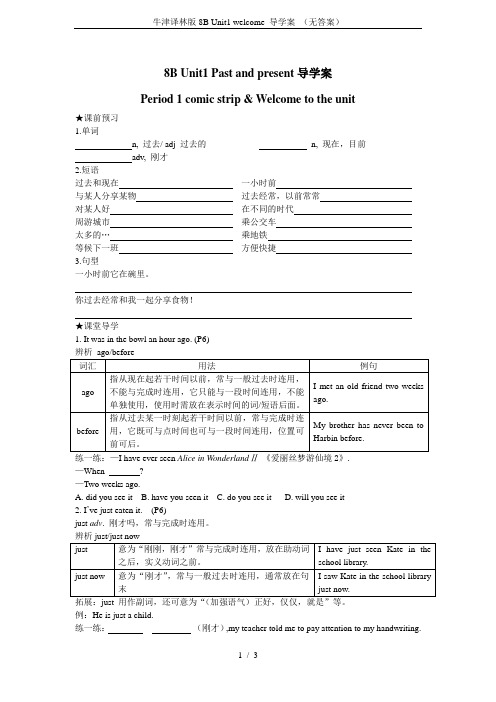
8B Unit1 Past and present 导学案Period 1 comic strip & Welcome to the unit★课前预习1.单词n, 过去/ adj 过去的 n, 现在,目前adv, 刚才2.短语过去和现在 一小时前 与某人分享某物 过去经常,以前常常 对某人好 在不同的时代 周游城市 乘公交车 太多的… 乘地铁 等候下一班 方便快捷3.句型一小时前它在碗里。
你过去经常和我一起分享食物!★课堂导学1. It was in the bowl an hour ago. (P6)练一练:—I have ever seen Alice in Wonderland 《爱丽丝梦游仙境2》.—When?—Two weeks ago.A. did you see itB. have you seen itC. do you see itD. will you see it2. I ’ve just eaten it. (P6)just adv . 刚才吗,常与完成时连用。
例:He is just a child.练一练: (刚才),my teacher told me to pay attention to my handwriting.3. You used to share food with me! (P6)used to 意为“过去常常,以前常常”,后接动词原形,表示过去的某种习惯,指过去经常反复发生的动作或状态,但现在已不复存在。
used to 只有一种时态,即一般过去时。
The river used to be clean and clear.拓展:be/get used to (doing) sth 意为“习惯于(做)某事”He is used to getting up early.be used to do sth 意为“被用于做某事”Wood is used to make paper.练一练:I go sailing on the lake.A. am usedB. am used toC. used toD. usedMy grandfather live in the countryside, but now he living in the city.A. used to; used toB. got used to; gets used toC. used to; gets used to4.Transport at different times (P7)句中time 是名词,意为“时代;时期”,常用复数形式。
牛津英语8BUnit1全套教案
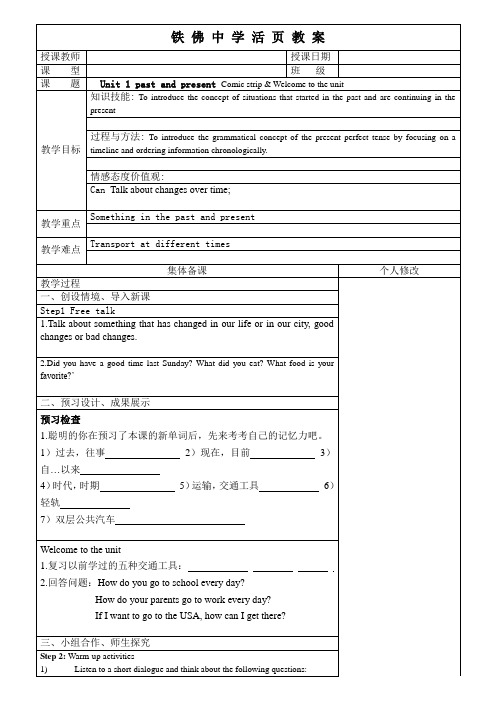
二、预习设计、成果展示
预习检查
1.聪明的你在预习了本课的新单词后,先来考考自己的记忆力吧。
1)过去,往事2)现在,目前3)自…以来
Make sentences according to the time table Eg: The peak tram has been in service since 1890/for 25 years.People began to use the peak tram in 1890
四、归纳总结、巩固提高
4)Change some sentence patterns according to the dialogueEg: I’ve eaten it ------ I haven’t eaten it .----- Have you eaten it? Yes,I have /No,I haven’t.
过程与方法:To introduce the grammatical concept of the present perfect tense by focusing on a timeline and ordering information chronologically.
情感态度价值观:
CanTalk about changes over time;
铁 佛 中 学 活 页 教 案
授课教师
授课日期
课 型
班 级
课Hale Waihona Puke 题Unit 1 past and presentreading(1)
1.1 Chapter 6 A new newspaper Using English,Writing 学案(沈阳牛津八年级下)
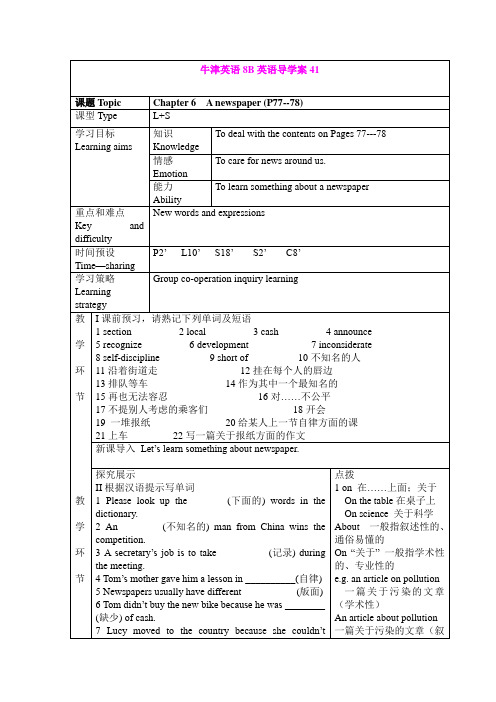
(缺少) of cash.
7 Lucy moved to the country because she couldn’t ________ (容忍) the noise in the city.
--- He is Niuniu. _____ a talented pianist, he is very famous. A For B As C At D With
点拨
1 on在……上面;关于
On the table在桌子上
On science关于科学
About一般指叙述性的、通俗易懂的
On “关于”一般指学术性的、专业性的
A of B about C with D at
2 Tom ______ the competition and he is the ______.
A beat, wins B won, winner C won, winer
3 The students should ______ a lesson in self-discipline.
e.g. an article on pollution
一篇关于污染的文章(学术性)
An article about pollution
3 A secretary’s job is to take _________ (记录) during the meeting.
4 Tom’s mother gave him a lesson in __________(自律)
5 Newspapers usually have different___________(版面)
牛津译林版英语8B八年级下册_Unit1_表格式教案
课题8B Unit1 past and present welcome to the unit 授课时间主备人总共课时 6 第几课时第一课时备课时间授课班级授课教师学情分析This unit is very easy , it is connected with the students’ life.教学目标 1.To introduce the concept of situations that started in the past and is continuing in the past.2.To introduce the grammatical concept of the present perfect tense.重点难点 1.To introduce the concept of situations that started in the past and is continuing in the past.2.To introduce the grammatical concept of the present perfect tense.授课内容和过程StepⅠRevision二次备课1. Dictate new words from own to check.Step ⅡPresentationA. Translate some sentences.1. He has been back for two hours.2. Jimmy has kept the book since last week.3. They have been married since 10 years ago.4. K ate has been a member of the club for 2 years.5. We have never been to Japan.Step ⅢWarm-up activitiesListen to a short dialogue and think about the questions.1. Where was Hobo’s food an hour ago?2. What did Eddie do?3. How has Eddie changed?4. How has Hobo changed?B. Listen to the dialogue again and try to repeat the tape.Step ⅣProduction1 .Read the dialogue together and understand the meaning of thedialogue.2.Change some sentencepatterns according to the dialogue.E. g: ---Have you done your homework?Yes, I have. / No,I haven’ t.Step ⅤPresentationTransport at different timesWrite the correct names under the pictures.B. Back to the past , complete the timetable.Step ⅥPracticeMake sentences according to the timetable.People began to use buses in 1935.Buses have been in use since1935.Step ⅦProductionDiscussionTry to make the sentences as long as possible. ( Group discussion)Step ⅧAssignment1. Recite Comic strip.2.Make sentences with “have/has been in use”.3. Preview Reading.作业布置 1. Review the contents of this lesson.板书设计教学反思课题8B Unit1 past and present Reading 1授课时间主备人总共课时 6 第几课时第二课时备课时间授课班级授课教师学情分析这一课时非常贴近学生的生活,很容易引起学生共鸣。
沈阳版牛津英语8B英语导学案20
育英学校牛津英语8B英语导学案19(李才必)课题Topic Chapter 3 A dangerous servant Reading(III) 课型Type L+S学习目标Learning aims 知识Knowledgewords and expressions学生姓名:情感EmotionTo know about electricity能力AbilityTo improve reading skills重点和难点Key and difficulty Words and expressions: Sentences: May I …?时间预设Time—sharingP2’L10’S18’S2’C8’学习策略Learning strategyGroup co-operation inquiry learning教学环节课前复习用所给动词的适当形式填空1. They _________ (be) friends since they were boys.2. Tom often _________ (go) to the school library to borrow books.3. By the end of last term, we _______ (learn) more than one thousand English words.4. Please _________ (not make) any noise. We are having a meeting.5. I am very sorry. I really _________ (not know) you were having a talk here.6. The boy is used to _________ (get) up early now.新课导入We have known something about France. Let’s know about it in detail now.探究展示翻译下列句子1.电是我们看不见的一种能量。
牛津译林版八年级下册导学案:8BUnit5(14课时)教学案
8B Unit5 Good manners第一课时Comic strip and Welcome to the unit班级:姓名:【学习目标】1、了解各种礼仪知识。
2、用英语谈论如何在公共场所举止得当。
3、培养学生良好的行为习惯【学习重点、难点】You’re old enough to learn about manners now.【学习过程】一、课堂学习研讨1.manners n.礼貌;礼仪;规矩 manners作名词用,意为“礼仪,礼节”,常用复数形式。
manners的意思是“方式,方法,举止,态度”His were praised by his teachers 他的彬彬有礼收到了老师的称赞2.politely adv.礼貌的You should deal with him .你应该待他更客气些He stood up when the lady the room这位女士走进房间里时,他有礼貌地站了起来。
3.Litter n. 垃圾;杂物(1)Litter 作为不可数名词用,意为“垃圾,杂物”同义词rubbish .Lf you see in the corridor , .如果你看到走廊里有垃圾,就把它捡起来(2)litter也可作为动词用,意为“乱丢,乱扔”Don’t the ground with 勿随地乱扔纸屑4.run(1)做不及物动词用,意为流动from her eyes 泪水自她脸上流下(2)做不及物动词用意为,运转,进行The machines and 机器日夜不停的转动5.pick vt.采摘 pick作动词用,意为,摘采all the apples off the tree 把树上的苹果都摘下来6.we should keep quiet 我们应该保持安静(1)keep 作连系动词用,意为保持,后接形容词! Dad is sleeping .保持安静。
爸爸在睡觉。
(2) keep 做行为动词用,表示“……处于某种状态”keep (keep +宾语+补语)He me for 他让我等了一半小时(3)keep 做行为动词用,还有保持,饲养,遵守,日记It’s not easy to pet dogs 饲养宠物狗不容易Do you every day ?你每天写日记吗?(4)keep 构成的一些短语使某人离开与……保持联系继续做某事二、课堂检测(约10分钟)一.根据句意及提示完成单词1.Draw a straight (线,行)across the top of the page.2.People who drop (垃圾,杂物)can be fined in some cities.3.Soldiers are expected to _(遵守,服从)orders without questioning them.4.We are going to the farm to p apples.5.I think it’s our (轮流)to drive the kids to school this week. 二.用所给词的适当形式填空。
八年级英语下册 Chapter 1 France is calling Speaking导学案(无答案) 牛津沈阳版
反 思
The ways to ask for directions and give directions
时间预设 Time—sharing 学习策略 Learning strategy 教 学 环 节 课前复习
Group co-operation inquiry learning
选择并抄写单词
1. We use ______(a/an, the) before nouns when we mention them for the first time. 2. ________(Answer, Pick) the phone for me, please. I am too busy now. 3. Hang you coat ________( on, in ) the walthe, / )North Pole, a rather cold place. Today is the __________(begin, beginning) of the new term. 新课导入 Have you ever been to a strange city and lost your way? What would you do if such things happened? 探究展示 I 熟悉下列词语 ask for directions__________ get to… _________ 点拨 We can ask for directions like this: 我们可以像这样问路: How do you get to…? Can you tell me the way to…? Can you tell me how I can get to…? Can you tell me how to get to…? Where is …? Which is the way to…? We can give directions like this: 我们可以像这样指路: Take the first turning on the right. = Turn right at the first turning.
- 1、下载文档前请自行甄别文档内容的完整性,平台不提供额外的编辑、内容补充、找答案等附加服务。
- 2、"仅部分预览"的文档,不可在线预览部分如存在完整性等问题,可反馈申请退款(可完整预览的文档不适用该条件!)。
- 3、如文档侵犯您的权益,请联系客服反馈,我们会尽快为您处理(人工客服工作时间:9:00-18:30)。
6 A fireman is setting up the ladder.一位消防员正在架梯子
7 one fireman quickly climbed up the ladder and reached the window.
一位消防员迅速爬上了梯子,来到了窗前
8 At last, the fireman helped both of them down the ladder to the ground.最后,这位消防员帮着他们俩顺着梯子下到了地面。
A very hard B too difficult C so strange
( )8 He slept ______ the window open last night.
A in B over C with D near
( )9 Don’t push to the front, you have to wait your ___
A chance B duty C line D turn
点拨
1 make a fire生火
2on fire着火,失火(表状态)
3catch fire着火(开始燃烧)
4There is no smoke without fire.
无火不起烟。无风不起浪。
5 Think smoke is coming out of the building.
1fireman(复数)_______ 2German(复数)_________
3wave(过去式) ________4reach(同义短语) _________
5spread(过去式) _________6 speak(过去式) ________ 7wet(过去式) _________8 lead(过去式) _________
4 __________ the place in a hotel or office building where you go to say that you have arrived, to enquires, appointments.
5. ________ the soft part inside your mouth that you can move and use it for speaking, tasting sth.
育英学校牛津英语8B英语导学案14(李才必)
课题Topic
Chapter 2 Blind man and eyes in fire drama
More practice学生姓名:
课型Type
L+S
学习目标
Learning aims
知识
Knowledge
To deal with language of more practice on Page28
4消防车_____________ 5支起梯子____________6在梯子上_____________
7爬上梯子___________ 8在窗口_____________ 9向……呼喊_____________
新课导入: Let’s learn about a report
I请根据课文及点拨完成下列内容
II用所给词的适当形式填空
1 The _______(fireman) are busy putting out fire.
2 Yesterday, there _______ (be) a fire at the hotel.
3 A blind man ________ (stay) at the hotel at that time.
时间预设
Time—sharing
P2’ L10’ S18’ S2’ C8’
学习策略
Learning strategy
Group co-operation inquiry learning
教
学
环
节
教
学
环
节
课前复习完成下列短语
1着火_____________ 2浓烟_____________ 3……出来_____________
C don’t watch, wanting D not to watch, want to
( )5— Do you mind if I take the seat next to yours?
—_____________.
A Yes, please B You’d better not C That’s all right
情感
ibe a fire according to the picture on Page 28
能力
Ability
To be aware of fire in life
重点和难点
Key and difficulty
To learn some new words and expressions
( )3 It’s very nice _____ you _____ me with the work.
A for, to help B of, help C of, to help
( )4 My mother told me _____ TV, but I really_____.
A not watching, to want B to not watch, want
4 The dog barked ________ (loud).
5 The fireman didin’t want _______ (take) the dog.
6 I think the air in the country is _______ (fresh) than that in the city.
honest student?
A the, the B an, a C the, an D a, a
( )2—What should I do, doctor?
—______ healthy, you should take more exercise.
A keep B keeping C To keep D Having kept
( ) 6—Can you understand me?
—Sorry. I can ______ hear you clearly.
A almost B never C hardly D nearly
( )7The question is _____ that nobody can answer it.
9 again and again反复地
反馈检测1. ___________ the power of seeing eyesight.
2. __________ a state in which all parts are of equal or proper weight
3__________ a group of exciting events
6. ________ a single thing among a set or on list
7._________ to say suddenly because of strong feeling
8 ________ to say or do again.
9_________ to bring or show the way to sb. or sth. by going in front.
10. _________ a large letter at the beginning of a name.
11. _________ to make the sound that dogs make
12. _________ a place or position
反
7 Chocolate is usually _______ (child) favourite food.
8 Thank you very much for _______ (invite) us to your party.
III选择
( ) 1Look at ______ boy in the classroom. Is he ______
